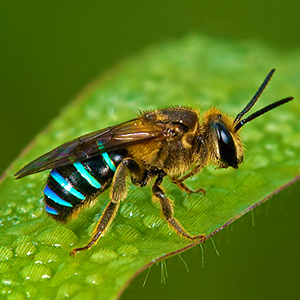
The Turning Dance of the Bee
A dialogue on musical concepts, motifs and form in contemporary classical music between composer and performer.
Syzygy Ensemble has been pioneering the vitality and performance of contemporary classical music for 10 years. In Turning Circles this September, Syzygy performs Liza Lim’s composition The Turning Dance of the Bee, an exploration of motifs from the natural world, Australiana, and its influence on dance as a classical music form.
Syzygy’s cellist Campbell Banks spoke with Liza about her composition and where it all began - with her deep fascination with bees.
Campbell Banks (CB): We’ve been enjoying the challenge of putting your composition The Turning Dance of the Bee together in rehearsal! The title struck me when I first heard it, as my ignorance of bee revelry left me struggling to join the concepts of ‘dance’ and ‘bees’ into a coherent image in my mind. What is the meaning behind the title and do bees really dance?
Liza Lim (LL): We perhaps like to think that only humans have art and aesthetics, but I think we take our cue from the natural world. Art is an expression of deep patterns of being whether you’re a human or a bee.
Researchers say that honeybees dance as a communication system to share knowledge about sources of flowers rich in nectar and pollen. They perform a ‘waggle’ dance that traces circles or a looping figure eight, angling their movements against the direction of the sun as navigational information for fellow bees.
I’d like to think that it’s not just for practical reasons but that there’s a poetic and ecstatic dimension to the dance.
CB: How did you first encounter the ‘waggle’ dance and what led you to turn this inspiration into a composition?
LL: Bees are very much at the forefront of conversations about the extinction crisis that we’re now in – they’re in decline all over the world which is incredibly serious because without these pollinators we’re done for.
I’ve long been interested in the incredible culture of bees, their social structures and the kind of soul wisdom they bring.

I’m also a devotee of inner urban gardening. I have a tiny garden in my front yard in South Yarra comprising two long planter boxes next to the driveway and I love spending time out there poking amongst at the veggies and observing the wildlife. I’d love to keep bees but don’t have space so I plant things they can visit. The restaurant down the street has hives on its roof as part of the popular urban bee-keeping movement which has spread around the world (you can check it out here).
Australia has some of the most strikingly beautiful native bees in the world and the best days are when I see Australian native blue banded bees in the garden. (Australia also has the cutest bee – check out the golden, fluffy, chubby ‘teddy bear’ bee)
CB: Your composition has two movements, Solar and Lunar. Given the integral role of the sun in bee navigation, how do we interpret these movement titles? Some species of bees navigate by moonlight, so can the audience expect to hear a change in the rhythmical impulse in the Lunar movement?
LL: Yes, Solar and Lunar are different rhythms, different qualities of time – one is more active and the other more languid and contemplative.
CB: There are many wonderful passages throughout the work but two have sparked Syzygy’s curiosity. The end of the first movement sees the clarinet and piano settle into a genuine groove, with the slap-tongue of the clarinet propelling the movement to a close (our clarinettist Robin Henry has dedicated much blood and a calloused tongue to this passage, to brilliant effect). It seems significant that a clear pulse emerges and dominates at the end of the movement. What is the meaning of this passage?
LL: The first part begins with ‘song’ in the ornamented violin line and ends with ‘dance’ with that bass clarinet/piano groove!
CB: We are looking forward to performing this in the brilliant acoustic of the Primrose Potter Salon where we’ll be opening the concert with the sound of stone on concrete tile! Is there anything else you’d like to tell the audience (or us) before the performance?
LL: Support the bees! Support your local beekeeper by buying their honey. It might be more expensive than cheap supermarket honey (which can be doctored by mixing low grade honey with corn syrup). Natural organic honey is a beautiful thing with wonderful anti-bacterial properties and is the joy of the earth in edible form.

